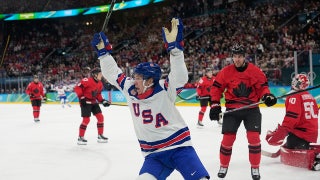NEW YORK – Laurel Richie acknowledged she doesn't know a lot about the WNBA's history. Still, days after being hired as the WNBA's third president, she called it a 'dream job.'
"I am learning along the way," Richie said Tuesday on a national conference call with reporters. "I have been, as part of the interviewing process, spending lots of time with many, many people with the NBA and WNBA. I am on that learning curve."
A chance encounter with Seattle Storm CEO Karen Bryant at a luncheon in February led to the league's interest in the veteran marketing executive for the vacancy created by Donna Orender's departure nearly two months earlier.
Richie, hired last Thursday to take over the league entering its 15th season, has more than three decades of experience in consumer marketing, corporate branding, public relations and corporate management. She has worked for Ogilvy and Mather, an international advertising company, and served most recently as senior vice president and chief marketing officer for Girl Scouts of the USA.
"This opportunity for me feels like a culmination of everything I've done at Ogilvy and all of the work at Girl Scouts," Richie said. "It is an interesting opportunity that's full of challenge, and it is a chance to sort of celebrate and recognize and elevate the great things that women are doing.
"For me, it's a dream job."
NBA commissioner David Stern downplayed Richie's lack of basketball background as a negative factor, citing her experience as a synchronized swimmer to show her interest in sports.
"We found somebody who was adept with respect to sports ... culturally adept at understanding what impact the game and the players could have on the community, the global community."
Stern then used his personal history as an example.
"My own basketball background was ripping up my ACL in a lawyer's league," he said. "So I don't think it's essential to have played the game at a high level at all."
Richie, who acknowledged she's watched WNBA games on TV but never attended a game, will officially take over on May 16. She intends to immediately visit teams around the country to familiarize herself with the league's owners, players and even fans. The WNBA season begins June 3.
"I absolutely plan on hitting the road," she said. "I start on the 16th and my bags are already packed. A priority for me is to really get into the market, to get to a game so that I can wipe that off my record, to really meet with players, meet with owners, meet with fans, meet with sponsors, meet with the media."
Stern denied any notion the NBA was involved in the day-to-day operations of the women's league, saying it would be run by Richie and Renee Brown, the senior vice president of basketball operations for the WNBA.
Stern said Richie's job will be to continue the work of her predecessors, Orender and Val Ackerman, and that she didn't have any special directives other than "to make all of our teams in the league very profitable." Five teams have marquee jersey sponsorships, attendance at games has risen, and the WNBA is in the midst of an eight-year deal with ESPN.
"We're doing OK, making a living," Stern said. "Our teams are doing better than they've ever done. ... We're getting to a point where we think this may be the season where it's break-even and better for all of our teams."
Richie hopes one way the league can do better will be to proactively target people like her who viewed games on TV but didn't take the next step and buy tickets. She said her main reason for not going was "not necessarily being approached."
"So part of what I want to think about is how do we reach out to people and engage them versus assuming or putting the burden on them to come and grab us," she said.
"I feel like there's a terrific product to work with, and that makes the job so much easier. It's not without its challenges, but a lot easier than a tough sale."
Richie's hiring is historic as she becomes the first black woman to be in charge of a professional sports league, a distinction she doesn't take lightly.
"I do take the notion of being a role model very seriously, a role model for women, a role model for African Americans," she said. "That is, in fact, a big reason of why this opportunity is so interesting and important to me."
Ackerman was the WNBA's first president, hired in August 1996 — a year before the league began play. Orender replaced Ackerman in April 2005 and announced in the beginning of December she was stepping down to start a marketing and media strategy company. Her last day on the job was Dec. 31, and NBA vice president Chris Granger assumed her duties in the interim.








































